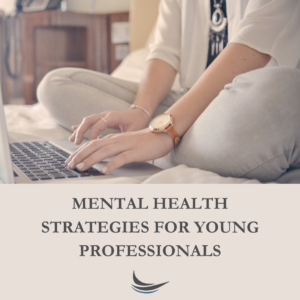Mental Health Strategies for Young Professionals
 The transition from student life to the professional world can be both exciting and challenging. Young professionals often face increased responsibilities, work-related stress, and the pressure to perform at their best. In the pursuit of career success, it’s essential not to neglect mental health. In this blog post, we’ll explore valuable mental health strategies for young professionals to help them thrive both personally and professionally.
The transition from student life to the professional world can be both exciting and challenging. Young professionals often face increased responsibilities, work-related stress, and the pressure to perform at their best. In the pursuit of career success, it’s essential not to neglect mental health. In this blog post, we’ll explore valuable mental health strategies for young professionals to help them thrive both personally and professionally.
- Prioritize Self-Care
Self-care isn’t selfish; it’s a fundamental aspect of maintaining good mental health. Make time for activities that rejuvenate you, whether it’s reading, practicing yoga, taking nature walks, or simply enjoying a quiet moment with a favorite hobby. Prioritize self-care as you would any other commitment in your life.
- Set Boundaries
The demands of a young professional’s career can sometimes spill over into personal time. It’s crucial to set boundaries between work and personal life. Define clear working hours and resist the urge to check emails or take work calls during your off-time. Maintaining a work-life balance is vital for mental well-being.
- Manage Stress Effectively
Stress is an inevitable part of any job, but how you manage it matters. Practice stress-management techniques such as deep breathing, meditation, or progressive muscle relaxation. Identifying stressors and finding constructive ways to address them can help you maintain your composure during challenging times.
- Cultivate a Support Network
Building a support network of friends, family, and colleagues can be invaluable for your mental health. Share your experiences and feelings with trusted individuals, seek their advice, and lean on them when needed. Social support can provide emotional stability and resilience.
- Maintain a Healthy Lifestyle
A balanced diet and regular exercise are essential for overall well-being. Proper nutrition and physical activity not only promote physical health but also have a profound impact on mental health. Make time for nutritious meals and incorporate regular exercise into your routine to boost your mood and energy levels.
- Seek Professional Help
If you find yourself struggling with persistent feelings of stress, anxiety, or depression, don’t hesitate to seek professional help. Therapists and counselors can provide valuable guidance and strategies for managing your mental health effectively.
- Time Management
Time management is a crucial skill for young professionals. Use tools like calendars, to-do lists, and time-blocking techniques to organize your work efficiently. A well-structured workday can reduce stress and increase productivity.
- Take Breaks
Avoid burnout by taking regular breaks throughout the workday. Short breaks can help you recharge and improve your focus. Consider a quick walk, a few minutes of stretching, or simply stepping away from your desk for a change of scenery.
- Develop Coping Strategies
Identify healthy coping strategies for dealing with workplace challenges. Instead of bottling up your emotions, express them constructively. For example, if you face a difficult situation with a colleague, practice assertive communication rather than suppressing your feelings.
- Practice Mindfulness
Mindfulness involves being fully present in the moment and accepting your thoughts and feelings without judgment. Incorporate mindfulness practices into your daily routine, such as mindful breathing exercises or short meditation sessions. These practices can help reduce stress and increase self-awareness.
- Set Realistic Goals
It’s natural to have ambitious career goals, but setting unrealistic expectations can lead to disappointment and stress. Break down your long-term goals into smaller, achievable steps. Celebrate your achievements along the way, no matter how small they may seem.
- Embrace Learning and Growth
View challenges and setbacks as opportunities for growth and learning. Mistakes are a part of professional life, and they can be valuable lessons. Adopting a growth mindset can help you bounce back from setbacks and maintain a positive outlook.
- Disconnect from Technology
Constant connectivity can contribute to burnout and anxiety. Set designated times to disconnect from work-related emails and notifications, particularly in the evening and on weekends. This digital detox can help you recharge and maintain work-life balance.
- Plan for Vacation and Downtime
Don’t neglect the importance of taking vacation time and regular downtime. Vacations provide a chance to relax, recharge, and detach from work-related stressors. Use your allotted vacation days wisely to prioritize your mental health.
As a young professional, your mental health is a valuable asset that contributes to your overall success and happiness. By implementing these mental health strategies, you can build resilience, manage stress effectively, and maintain a healthy work-life balance. Remember that seeking support when needed and prioritizing self-care are not signs of weakness but rather signs of strength and self-awareness.



























